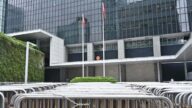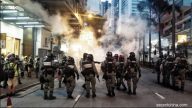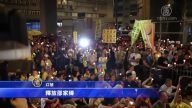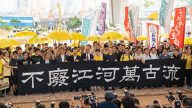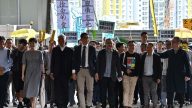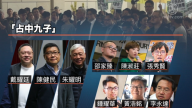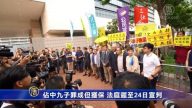【新唐人2014年06月13日訊】中共日前針對香港發表的《白皮書》,激起各界港人的強烈反彈,香港各大報章以及各界人士紛紛針對《白皮書》所提出的「中央擁有對香港的全面管治權」和「『愛國』是治港者的基本政治要求」等部分做出批評,香港輿論認為,中共最初承諾的「一國兩制」已死,《白皮書》是中共對香港管治權的「攤牌」,要讓香港民主普選落空。
中共國務院6月10號發表的《白皮書》——《「一國兩制」在香港特別行政區的實踐》表明,「香港的高度自治權不是完全自治,也不是分權,是中央授予的地方事務管理權。」《白皮書》中,還把香港法官及司法人員視為「治港者」,要求他們必須愛國。
這份《白皮書》引髮香港各界的強烈反彈,11號,多個團體到香港「中聯辦」焚燒《白皮書》,抗議《白皮書》矮化香港的自治地位,破壞港人治港的承諾,香港民眾表示,港人不會因為威嚇而放棄爭取公民提名,他們呼籲香港市民參與6月22號的公投,及「七一民主大遊行」。
香港「公民黨」則要求中共收回《白皮書》﹔同時,香港「大律師公會」發表四頁聲明,批評《白皮書》不應將法官和司法人員視為「治港者」,令人以為香港法院是政府機構的一部分,與政府互相配合。
「香港城市大學」政治學教授鄭宇碩指出,《白皮書》帶出的訊息是「一國」壓倒「兩制」,目前香港的高度自治受到了威脅,等於宣佈「香港高度自治已死」。
香港城市大學政治學教授鄭宇碩:「當初在中、英談判的時候,中央領導人一直強調,允許香港擁有高度的自治,現在都不再談這個高度的自治了,現在非常強調甚麼都是一國才是根本,甚麼都是中國的主權,中國的國家利益是最重要的考慮啦。」
美國媒體《大紀元時報》指出,中共發佈的《白皮書》是變相重彈「23條立法」老調。中共的「愛國」是以「愛黨」為衡量標準。在中共看來,無論是香港舉行的「六‧四」燭光集會﹔還是6月22號「佔中」行動,和「七一大遊行」,都不是「愛黨」行為,因此需要以《白皮書》的形式,對香港民眾進行恐嚇、彈壓和威脅。
「六‧四」25週年紀念日當晚,香港「支聯會」舉行的「六‧四」燭光集會超過18萬人參加,民眾攜手呼籲:平反「六‧四」,結束中共一黨專政。
香港作家、自由撰稿人張成覺分析,港人的自由發聲讓中共非常恐懼,這個《白皮書》出臺,可以說是中共的「攤牌《白皮書》」。
香港作家、自由撰稿人張成覺:「這意味著2017年普選這個問題,行政長官候選人,候選人這個門檻怎麼定,北京就在候選人這個門檻上搞了一個篩選,一定要甚麼愛國、愛黨的才能進入名單,那個東西你設了這麼一個門檻的話,那等於是,就把別的選擇都給堵死了。」
香港「佔領中環」行動發起人戴耀廷表示,北京越是希望香港市民「別幻想得到真普選」,港人就要更加告訴北京「我們不認命」。
張成覺認為,中共搶在香港6月22號「佔領中環」全民投票前,拋出《白皮書》,是在恐嚇、威脅香港民眾,不讓港人發聲。
張成覺:「其實號召『佔中』的,這幾位因為他們我都認識,都講的很清楚,他們是和平的、理性的一種行動,並不構成暴力或者是動亂,但是北京它就把公民抗命就看成是『顛覆』,你就是要『顛覆』共產黨的政權,或者說是反華勢力這麼一個作用。」
不過,張成覺也指出,中共的行為只會引發更多香港民眾反感,這個《白皮書》將會催生一些原本不關心「佔中」的港人,6月22號站出來為「佔中」投票、催票。
《大紀元》指出,如果香港民眾6.22「佔中」公投取得極佳的社會效應,會引起中國大陸民眾關注,他們會通過民間的自發投票活動讓中共「下臺」,也可能觸發中共政局突變。
採訪編輯/李韻 後製/陳建銘
Communist China: The “One Country Two System” Is Dead
A Chinese Communist Party (CCP) white paper regarding Hong Kong which states the CCP holds “comprehensive jurisdiction” over Hong Kong, and that patriotism to China is the minimum political qualification in governing Hong Kong has provoked a strong reaction in Hong Kong. Critics believe ‘one country, two systems’ is dead. The white paper is the regime‘s showdown on the governance of Hong Kong. The universal suffrage in Hong Kong will fail.
The Chinese State Council released its white paper, “The practice of one country, two systems policy in Hong Kong” on June 10. It states that “the high degree of autonomy of the HKSAR is not full autonomy, nor a decentralized power.” The high degree of Hong Kong autonomy comes solely by “authorization” from the central leadership. It also requires judges and judicial officers to rule with patriotism.
This white paper triggered strong backlash in Hong Kong. A number of organizations burnt the white paper at Hong Kong’s Liaison Office in protest. They objected to the degredation of Hong Kong’s autonomy and a breach of promise to Hong Kongers in the white paper. They claimed no threat will deter their decision to fight for the nomination of civilians in power. Hong Kongers are encouraged to participate in an unofficial referendum on June 22 and the July 1 Hong Kong rally.
The Civic Party demanded that the Communist regime retract the white paper. A statement issued by the Hong Kong Bar Association criticizes the white paper’s reference to judges and judicial officers as “administrators” of Hong Kong, which misleads people to believe courts are associated with governmental organs.
Professor of Political Science, City University of Hong Kong, Joseph Cheng believes the white paper reveals the “one country” overwhelms the “two systems” and that it is a threat to Hong Kong’s autonomy. It is tantamount to announcing the autonomy no longer exists.
Joseph Cheng: “During negotiations before the handover of Hong Kong to China, Communist leaders stressed to the British the autonomy of Hong Kong. But, all it talks about now is the unitary state, the authority of the central leadership, and the interests of China."
The Epoch Times commentary points out the white paper is a disguised Hong Kong Basic Law Article 23—the anti-subversion law. The Chinese Communist Party (CCP) equates “patriotism” to “obedience to the Party”. In the eyes of the CCP, the candlelight vigil in commemoration of the June 4 Massacre, Occupy Central on June 22, and the July 1 rally are not acts of patriotism. The white paper serves to threaten, suppress and intimidate Hong Kong.
To commemorate the 25th anniversary of the June 4 Massacre, Hong Kong Alliance in Support of Patriotic Democratic Movements of China held a candlelight vigil with more than 180,000 participants. While joining hands, they demanded the vindication of the June 4 student movement and the end of the CCP.
Hong Kong writer Zhang Chengjue analyzes that the call for freedom by Hong Kongers has frightened the CCP. The CCP has thus manipulated the white paper in a showdown with Hong Kong.
Zhang Chengjue: “It sets a threshold for the Chief Executive elect. Beijing defines love for China and love for the Party as mandatory for candidates. That restricts all other options."
Benny Tai, promoter of the Occupy Central campaign, said that the more Beijing says no to the universal suffrage, the more Hong Kong people will say no to Beijing.
Zhang Chengjue believes the CCP has manipulated the white paper to intimidate and threaten Hong Kong prior to Occupy Central on June 22.
Zhang Chengjue: “In fact, we know the organizers of Occupy Central. They are clear about the peaceful and rational approach of the campaign. It is not about violence or unrest. But, Beijing considers civil disobedience as “subversion”, to the CCP or anti-China activity."
However, Zhang Chengjue points out that the CCP’s behavior will only lead to the disgust of more Hong Kongers. The white paper will wake up those who did not care about Occupy Central and move them to participate in the June 22 event.
Epoch Times commentary points out that the good social effect of Occupy Central could stimulate mainland Chinese to conduct a voluntary vote to denounce the CCP ruling and trigger political turmoil for the CCP.


